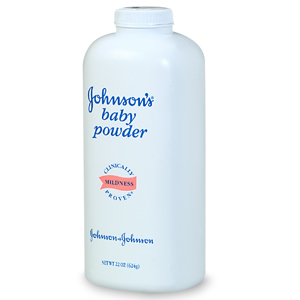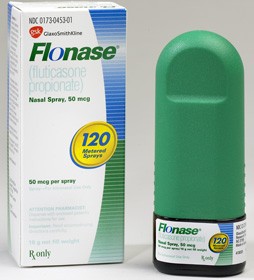 Top Class Action Lawsuits
Top Class Action Lawsuits
Talc Troubles? It’s one thing to file a consumer fraud class action lawsuit alleging mislabelling infractions regarding “all natural” and “ no preservatives”—for example, but a consumer fraud class action filed this week against Johnson & Johnson alleging its classic baby powder products are associated with a significant increase in the risk of ovarian cancer, well that’s just a whole different level of muckery. Why do I continue to be surprised by these things…
According to the baby powder lawsuit, filed by plaintiff Mona Estrada (Mona Estrada v. Johnson & Johnson et al., case number 2:14-cv-01051, in the U.S. District Court for the Eastern District of California) studies have shown a 33% increased risk for ovarian cancer associated with talcum powder among women who use it on their genitals. Yet the only warnings on the product labels tell users to keep the powder away from their eyes, avoid inhalation and to use externally. Estrada, who has used the product since 1950, claims she expected Johnson’s Baby Powder, made of scented talc, to be safe. Further, the lawsuit claims J&J has failed to disclose the information regarding ovarian cancer risk on its product labels.
“As a result of the defendants’ misrepresentations and omissions, plaintiff and the proposed class have purchased a product which is potentially lethal,” the complaint states. Estrada alleges she would not have purchased the powder had she been aware of the risk. You think? Thankfully, Estrada is not claiming any personal injury.
Estrada further alleges she has bought J&J’s powder since 1950 and believed all this time that the product was safe to use on any external part of her body, and that J&J encouraged women to use the product daily.
“Although the label has changed over time, the message is the same: that the product is safe for use on women as well as babies,” the lawsuit states. The lawsuit also states that J&J has known of studies showing that women who used talcum powder on their genital area had a higher risk of ovarian cancer, since at least 1982. Further, the author of a 1982 study was contacted by a J&J doctor who was told the company it should add a warning label to the bottle.
The talc lawsuit goes on to state that the American Cancer Society (ACS) allegedly said that a 2008 study, linking higher usage of talcum powder to increased risk of cancer, showed the powder “probably” increased the risk for cancer. The ACS compared talcum powder to asbestos, postmenopausal hormone therapy and radiation. Oh great.
The lawsuit claims J&J violated the California Consumer Legal Remedies Act and Unfair Competition Law, negligently misrepresented its powder and breached its implied warranty. This is going to be interesting.
Beauty Blunder? Aveda Corp, and its parent company, Estee Lauder Inc, and are facing an employment lawsuit filed by a former beauty school student who alleges the beauty companies treat their trainees as unpaid employees in violation of state and federal labor law. There must be some law of physics that works something like—the larger the company the less they pay—or try to pay…
Filed by lead plaintiff Jazlyn Jennings, the lawsuit claims that Aveda uses students at its California cosmetology schools as unpaid workers, requiring them to provide full hair and beauty services to paying clients, while at the same time claiming to provide educational experience to those trainees. Yes—it’s an educational experience alright—just not the kind the students signed up for.
The nitty gritty—“The California defendants led plaintiff and others…to believe that they were paying tuition to learn the skills necessary to succeed in the glamorous profession of beauty and cosmetology. Instead, they converted students into student employees to profit from their free labor.”
According to Jennings, she trained at the Aveda Institute Los Angeles from April 2011 to June 2012, where she provided haircuts, makeup removal, manicures and other services to customers without being compensated for her labor.
Jennings alleges that the institute’s staff did not properly supervise students who shelled out “thousands or tens of thousands” to participate in its yearlong training program, providing just four supervisors for the 40 students working on the salon floor, in violation of state regulations.
In addition to the Aveda institute in Los Angeles, Jennings also names its San Francisco-based school, the Cinta Aveda Institute Inc., and its Southeast institute operator, Beauty Basics Inc., as co-defendants in the employment lawsuit. “[Defendants] could have hired employees who they would have had to have paid at least minimum wage but instead chose to displace such employees with the free labor they demanded of their student employees,” the lawsuit states.
Additionally, according to the allegations, students were compelled to sell Aveda products to the public, effectively transforming students into “non-commissioned salespeople.” And the litany of bad deeds goes on to include handing over of tips and insufficient or completely absent supervision—if that’s not a contradiction in terms… but you get the picture.
So—bottom line—by failing to pay its “student employees,” the complaint claims that Aveda violated the minimum wage requirements of both California labor law and the federal Fair Labor Standards Act (FLSA). Additionally, Jennings claims Aveda failed to pay overtime, did not provide proper meal and rest breaks, did not provide accurate wage statements and engaged in unfair business practices.
Heads up—Jennings is seeking to represent a class of individuals who provided beauty services or sold products to paying customers in the named Aveda institutes from April 22, 2010, to the present. The class may also include student employees who cleaned or provided support services to Aveda’s beauty institutes in California.
Top Settlements
This settlement almost slipped under the radar this week—surprising given that the named defendants are Apple Inc, Google Inc, Intel Inc and Adobe Systems Inc. The tech worker settlement is, not surprisingly, pre-trial in the amount of $324 million—and it’s meant to end an antitrust class action lawsuit brought by by Silicon Valley tech engineers.
The lawsuit was filed in 2011, alleging that the four tech giants conspired to hold down salaries in Silicon Valley. You may remember some finger pointing at Steve Jobs over this one. In any event, the class action, filed in 2011 by Silicon Valley engineers, alleged that Apple Inc, Google Inc, Intel Inc and Adobe Systems conspired to refrain from soliciting one another’s employees in order to avert a salary war.
The trial, which will not be going ahead, surprise,surprise—was scheduled to begin at the end of May on behalf of roughly 64,000 workers who were seeking $3 billion in damages. Whoa Nelly—now that would have had an impact.
Ok—Folks—we’re done here—have a great weekend and we’ll see you at the bar!


